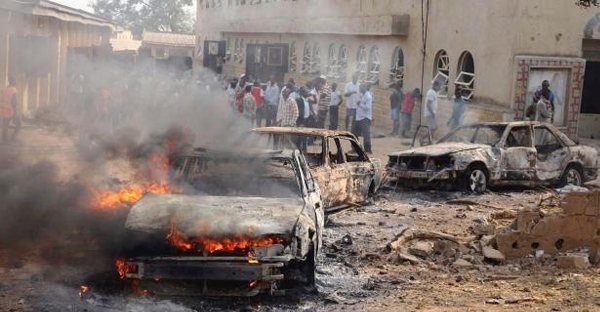Where the Persian Gulf and the Gulf of Oman meet rests today’s ever more famous Straits of Hormuz. The Straits have been a key talking point among media, politicians, and Pentagon staff. Only 21 miles wide at the narrowest point, Iran contends that it will close the Straits of Hormuz if international pressure against the Persian state continues. Many are questioning, “Can Iran really close the Straits of Hormuz?”
Whether Iran can close the Straits of Hormuz is like asking whether the Giants defense can completely “shut down” Tom Brady and his Patriots offense or whether the Patriots defense can completely “shut down” Eli Manning and the Giants offense. No one can answer such question unless they know what “shut down” actually means. Does “shutting down” a Super Bowl offense mean the opposing defense won’t get a touchdown, a field goal, a first down; or does it mean that the opposing defense won’t allow one positive yard gained?
The odds are virtually nil when it comes to shutting down either team’s offense to the point they don’t get at least one first down in their four quarters of play, let alone any positive yardage. The odds are that both teams will, at a minimum, have at least three points by the end of the game. As true as this is for next week’s Super Bowl, it is also true that if Iran decided to “close the Straits of Hormuz,” they will obtain some small scale tactical victories.
Closing the Straits of Hormuz can be achieved by the Iranians–at least for a marginal period of time. The closure of the Straits would likely not last long, nor would such tactic defeat any Western state fighting the Iranians. In fact, the two lane shipping waterway was temporarily closed in 1987 during the short-lived “Tanker War.”
Unfortunately, many intelligence professionals refuse to accept that the Straits can be shut down. Constant talk about Iranian military capabilities being swiftly defeated by American military supremacy is brought up. Unfortunately, the Iranians have proven not to adhere to international laws of warfare–asymmetric and unconventional tactics are their answer.
During the Millennium Challenge 2002 exercise, retired Marine General Van Ripper arguably defeated the Americans through his asymmetric tactics. He was overly generous with his mild terror activities incorporating non-conventional military measures. What would happen, though, if Iran was not as generous and imposed the most unfathomable tactics like mass human shields protecting Iran’s shorelines staged with heavy artillery?
Human shields have become a devastating problem for U.S. forces recently in Iraq and even at times in Afghanistan. Imagine main stream media covering a war against Iran filming U.S. naval or air power killing hundreds of “innocent” children and women. What would the international reaction be? Do we have adequate public affairs capabilities to neutralize the blowback from such an atrocity? The answer is an obvious no.
The situation presents another overly disturbing scenario. What would the U.S. rules of engagement be when our troops are faced with waves of Iranian children carrying bombs and grenades? Some would believe this scenario highly unlikely, but how few know anything about Iran’s tactics incorporating its Basij Mostazafan? The “mobilization of the oppressed” consists of short-term volunteer militias. Most of the Basij members are children. At one point in Iranian history, they were used to clear mine fields. Would Iran activate them to serve as suicide bombers knowing how soft America has grown in protecting the presumed innocent? Are our soldiers prepared to kill children knowing how the international community, let alone many Americans, will react?
Iran has an incredible track record of utilizing Shiite radicalized forces to conduct suicide missions. In fact, since 2005, Iran established an actual martyrdom training camp called Gharar-gah-e Asheghan-e Shahadat (Congregation of the Lovers of Martyrdom). Combine a mass human shield, children, and Iran’s martyrdom capabilities, and the country likely has the capabilities to temporarily close down the Straits of Hormuz.
With 17 million barrels of oil moved daily through the Straits, simply closing the waterway for a few days or weeks will result in devastating economic hardships throughout the world. Iran doesn’t need to close the Straits for any prolonged period of time to achieve a devastating blow to the international community. They can achieve an immediate tactical victory due to the economic hardships that would entail, then later achieve a strategic victory by a magnitude blowback from international observers of main stream media witnessing thousands of (innocent or not) women and children die at the hands of American and coalition forces.
War is like the Super Bowl. You have two teams fighting against one another. Tactically, both teams have victories, yet strategically, only one comes out on top. At the end of the game, no matter the victor, both teams realize each player received numerous bumps and bruises. Of course, many differences between war and football exist. The main difference–in war, bumps and bruises often result in lifelong injuries or death.
Kerry Patton, a combat service disabled veteran, is a senior analyst for WIKISTRAT and owner of IranWarMonitor.com. He has worked in South America, Africa, the Middle East, Asia, and Europe, focusing on intelligence and security and interviewing current and former terrorists, including members of the Taliban. He is the author of Sociocultural Intelligence: The New Discipline of Intelligence Studies and the children’s book American Patriotism. You can follow him on Facebook.

COMMENTS
Please let us know if you're having issues with commenting.